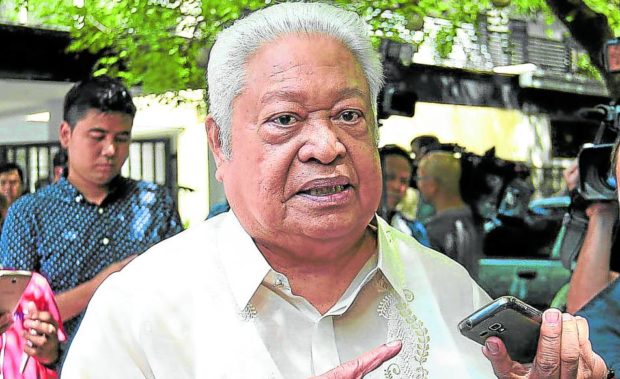Lagman says Co fails to justify excess in unprogrammed funds

FEBRUARY 28, 2017: Albay Rep Edcel Lagman leaving the venue of the Liberal Party meeting at Romulo’s cafe in Quezon City. INQUIRER file photo / EDWIN BACASMAS
MANILA, Philippines — Ako Bicol Rep. Elizaldy Co should just respond to questions on the constitutionality of excess P449.4 billion unprogrammed funds in the 2024 national budget instead of making personal attacks, Albay 1st District Rep. Edcel Lagman said on Wednesday.
Lagman said this in reply to Co’s assertions that the Albay lawmaker should include himself as a respondent in a petition against the 2024 General Appropriations Act (GAA), as the previous year’s budget also contained unprogrammed funds.
READ: Co says Lagman should be respondent of own petition vs 2024 national budget
Lagman was part of the bicameral conference committee that finalized the 2023 budget, while Co heads the House Committee on Appropriations under the 19th Congress.
“Appropriations Chairman Elizaldy Co engages in personal attacks instead of squarely confronting the constitutional issues on the questionable congressional allocation of an excess of P449,450,510,000 in unprogrammed appropriations over the President’s proposal of only P281,908.056,000,” Lagman said in a statement.
Article continues after this advertisement“In his response to the petition I filed before the Supreme Court challenging the infirm allocations, Co miserably failed to deny that the bicameral conference committee on the 2024 General Appropriations Bill (GAB) furtively inserted an excess of P449,450,510,000 in unprogrammed appropriations,” he claimed.
Article continues after this advertisementLagman maintained that increasing the unprogrammed funds by P449.4 billion meant that the annual budget breached the P5.768 trillion set by President Ferdinand Marcos Jr.’s National Expenditure Program (NEP).
The Albay lawmaker believes this is a violation of the 1987 Constitution under Article VI, Section 25, which states that Congress “may not increase the appropriations recommended by the President for the operation of the government as specified in the budget.”
“This prohibition covers both the programmed and unprogrammed appropriations proposed by the President in the [NEP] as the Constitutions do not distinguish between programmed and unprogrammed appropriations,” Lagman claimed.
“The bicameral conference committee report containing the infirm excess was ratified by the House and the Senate with alacrity without revealing or explaining the insertion,” he added.
Lagman also took offense to Co’s claims that the veteran solon may have forgotten that unprogrammed funds were also present in the past budgets crafted by the committee on appropriations — including past editions of the panel, which were headed by Lagman.
According to Lagman, wrong actions committed in the past must not be replicated and legitimized in the present.
“I have not forgotten that the practice of increasing the unprogrammed appropriations was the then-prevailing errant interpretation and practice wherein the prohibition on increasing the President’s budget proposal was limited to the programmed appropriations,” Lagman said.
“I have not forgotten to categorically mention this incorrect interpretation and practice in the petition. It is well-settled that irregular acts committed in the past cannot legitimize their continuation up to the present. What is wrong must be eventually junked,” he added.
Lagman filed a petition before the Supreme Court questioning the constitutionality of the 2024 budget due to the unprogrammed fund increase, which supposedly pushes the annual appropriation past the P5.768 trillion ceiling.
The increase in the unprogrammed funds for the 2024 budget was first revealed by Senate Minority Leader Koko Pimentel, who said that Malacañang’s original proposal of P281.9 billion was pumped to P731.4 billion, or a P450 billion increase.
READ: Lagman questions legality of allocation from unprogrammed funds
Despite these assertions from Lagman and Pimentel, lawmakers aligned with the majority and the Department of Budget and Management (DBM) itself maintained that the unprogrammed fund hike does not push the budget ceiling because these are only standby funds.